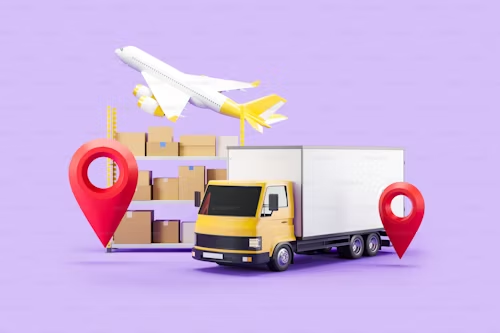In today’s global economy, supply chains stretch across multiple countries and regions, involving stakeholders who speak different languages and operate under various cultural contexts. Efficient communication within these supply chains is critical for ensuring seamless operations, reducing errors, and maintaining profitability. Here, translation plays an essential role, in bridging linguistic gaps and enabling companies to interact with their international partners, suppliers, and customers.
This blog explores the critical role of translation in global supply chains, focusing on how it facilitates communication, compliance, and efficiency in this interconnected world.
What exactly is Global Supply Chain?
A global supply chain involves the production, handling, and distribution of products or services across different geographic locations. These supply chains comprise various stages, including sourcing raw materials, manufacturing, warehousing, logistics, distribution, and final delivery to consumers. Since global supply chains encompass multiple countries, they involve different languages, cultures, legal systems, and business practices.
The complexity of managing a global supply chain increases exponentially when communication breaks down due to language barriers. Misunderstandings can lead to production delays, compliance violations, missed deadlines, or product defects, all of which can have serious financial and reputational consequences for businesses.
The Role of Translation in Facilitating Communication:
Effective communication is the cornerstone of any successful supply chain. In a global context, this means businesses need to communicate clearly with suppliers, manufacturers, logistics providers, and retailers who may speak different languages. Translation ensures that all parties can understand and exchange information accurately, reducing the risk of misunderstandings that can disrupt the supply chain.
Here are some key areas where translation plays a vital role in supply chain communication:
- Vendor and Supplier Communication:
Sourcing materials from international vendors or suppliers often requires negotiation, purchasing contracts, and detailed discussions about specifications and delivery terms. For businesses working with partners in different countries, translation ensures that both parties fully understand the terms and conditions of agreements, reducing the likelihood of disputes or miscommunication. Accurate translations of contracts, emails, invoices, and technical documents are crucial to maintaining smooth business operations and minimizing legal risks.
- Documentation Translation:
One of the most significant areas in global supply chains where translation is essential is documentation. Every stage of the supply chain process involves a variety of documents such as shipping manifests, customs declarations, import/export documentation, and compliance certificates. Translating these documents accurately is crucial for ensuring smooth transit across borders, avoiding delays, and ensuring that goods reach their destination on time.
Even minor errors in the translation of these documents can lead to customs holds, penalties, or even the seizure of goods, which can severely impact a company’s bottom line. For instance, inconsistent terminology in translated customs documents can lead to misinterpretation and potential violations of import/export regulations. For expert translation solutions, consult a trusted translation agency integrating proofreading into their workflow.
- Product Manuals and Safety Guidelines:
When products are shipped internationally, they must often be accompanied by product manuals, safety instructions, and guidelines in the language of the destination country. Inaccurate translations of these materials can result in customers receiving misleading information about how to use a product, potentially leading to safety risks or product returns.
Furthermore, many countries have strict legal requirements regarding the translation of safety information and user manuals into their official language. Companies must comply with these regulations to avoid penalties and ensure customer satisfaction. Translation ensures that these materials are not only legally compliant but also culturally adapted to the target market.
- Marketing and Branding Translation:
The final stage of the supply chain involves delivering products to customers, and this often includes marketing and branding efforts to create demand and raise awareness.
Translation is not merely about converting words from one language to another; it also involves localization, which adapts content to fit the cultural preferences and linguistic nuances of the target market. Accurate translations ensure that product branding aligns with the local culture and expectations, preventing potential misunderstandings or negative perceptions that could harm the brand.
Translation’s Role in Ensuring Compliance and Risk Management:
Global supply chains are subject to a myriad of legal and regulatory requirements that vary by country. Compliance with local laws and regulations is vital to avoid penalties, fines, or even legal action. In this context, translation helps ensure that businesses adhere to the rules of each market they operate in by accurately translating legal documents, contracts, and compliance paperwork.
- Compliance with Import/Export Regulations:
Each country has its own import and export regulations, including rules on tariffs, product safety, and customs requirements. Translating these regulations into a language that is fully understood by the entire supply chain is essential to avoid costly mistakes. T o ensure error-free delivery, consider collaborating with a professional translation company.
For example, a company shipping electronics to the European Union must ensure that all product documentation, including declarations of conformity, technical files, and labeling, is translated into the required EU languages. Failure to comply can result in delays, penalties, or even seizure of goods at customs.
- Ensuring Product Labeling Compliance:
Many countries have strict rules regarding the labeling of products, especially in industries such as food and beverages, pharmaceuticals, and consumer electronics. These labels must be translated accurately to ensure that consumers are provided with the correct information regarding ingredients, usage instructions, and safety warnings.
For instance, food labels must be translated into the official language of the country in which the product is sold. Failure to translate these labels correctly can lead to non-compliance with local laws, resulting in product recalls, fines, or legal challenges.
- Risk Mitigation in Contracts and Agreements:
Contracts between international partners form the backbone of any global supply chain. These contracts outline the obligations, rights, and expectations of all parties involved, and must be carefully translated to ensure clarity and mutual understanding. Even minor mistranslations in contracts can lead to serious legal disputes or breaches of agreement.
By employing professional translation services, companies can mitigate the risk of contractual disputes by ensuring that all terms and conditions are clearly understood by all parties involved.












